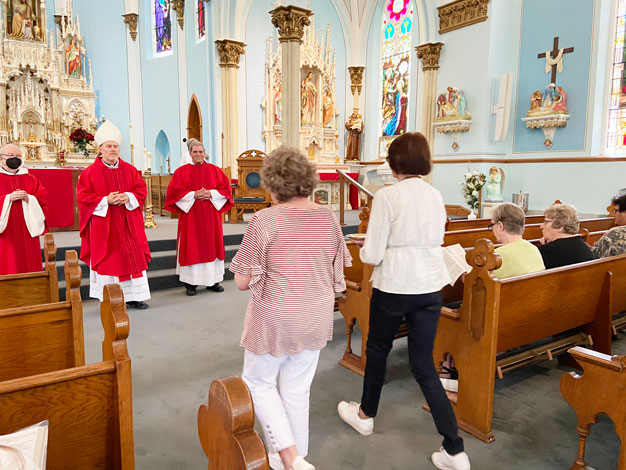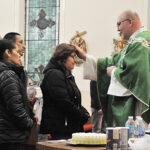
Two women bring forward the gifts during Pentecost Sunday Mass at St. Mary Parish in Riverside to Bishop Thomas Zinkula. Assisting the bishop are Deacon Frank Agnoli, left, and Deacon Dan Freeman.
By Barb Arland-Fye
The Catholic Messenger
IOWA CITY — Bishop Thomas Zinkula and his leadership team view big issues in the Catholic Church through the lens of the “See-Judge-Act” method of analysis. The recently completed diocesan Synod addressed those issues through an intentional, months-long listening process, what Bishop Zinkula views as the first component of See-Judge-Act. It is time to move to the second component, which involves discerning priorities on which to act.
Now through Nov. 20, Bishop Zinkula is asking parish councils and school boards “to pray, discuss and arrive at consensus on the three themes that resonate most with the realities and needs of their setting.” These priorities will come from among 11 themes that emerged in the Synod listening sessions that concluded this past spring. “The rest of this year we will do the discerning and judging, together, as a diocese, taking a look at what we’ve heard and then we will act. At the heart of it is evangelization,” the bishop said.
This next step is about discerning in the parishes, schools and other diocesan entities where the Holy Spirit is calling the faithful in light of local realities and concrete experiences, says Father Thom Hennen, the diocese’s vicar general and pastor of Sacred Heart Cathedral in Davenport.
“Building on the Synod is a direct response to what people shared through Synod listening sessions,” said diocesan Director of Evangelization Patrick Schmadeke. “Evangelization begins with the concrete realities of people’s experience, so there is a very natural resonance between the experience of the Synod and evangelization.
Evangelization is the mission of the Church. We are a mission-driven people. Building on the Synod gives further shape to this mission.”
Sharon Roling, a co-chair of the Vision 20/20 process said, “Building on the Synod work is a natural progression of the evangelization efforts we accomplished over the past five plus years. The fact that our diocese’s work has evolved and responded to Pope Francis’ call points to Bishop Zinkula’s strong leadership skills. Led by the Holy Spirit, Bishop and a core group of leaders from across the diocese are moving to the call for response stage.”
Roling, who is principal of St. Joseph Catholic School in DeWitt, added, “In my opinion, the response stage is the exciting part of the Building on the Synod work. We can begin to investigate ways to enhance the ‘fill your hearts’ areas and begin the healing work of the ‘break your heart’ portions identified in the summaries. The process by which this will be done will take place soon and it is my hope that people will positively respond to the call to be missionary disciples.”
Parishes, schools and other entities will use a packet the Davenport Diocese created to assist them in the discernment process. It begins with a short, instructional video and welcome, followed by the Synod Adsumus prayer, used throughout Vatican II and the diocesan synodal listening process.
Following the prayer is reflection on three priorities that a particular group chooses from among the 11 themes that emerged from the Synod listening sessions: leadership; welcoming/belonging; Church teaching/tradition; liturgy/Mass/sacraments; community; youth/family engagement; outreach/evangelization; prayer/spirituality; image of the Church; Church rules; and polarization/politics.
Understanding why someone selected a particular priority is essential to the process, Father Hennen said. “The 11 themes can be combined, in an organic way. There is some overlap.” The Diocesan Pastoral Council and Presbyteral Council were the first pilots of the discernment process, to be followed by Catholic school administrators and the Deacon Council. In October-November, the diocese requests feedback from all parishes, Catholic schools and other entities participating in the process.
In December, the input will be reviewed and the diocese will prioritize themes to address over the next three years. In January-February 2023, the diocese will gather local input on how to address the theme for year one and in the spring develop a plan and resources to address that theme. In May, a diocesan-wide gathering of local leaders will kick off the efforts for the year one priority. Parishes can tailor the priority to their community’s unique needs, Bishop Zinkula said.
“We can’t cover all 11 of these themes at once,” Father Hennen said. “We need to ask, What are people telling us about these themes? Which of these themes are more important? What needs to come first? We will address all of them; we just can’t do it in one year.”
A final insight Father Hennen gained from the pilot process occurred during his personal 15-minute reflection on priorities in which he did a quick SWOT analysis (Strengths, Weaknesses, Opportunities and Threats). He said he realized that leveraging the things that Synod participants said filled their hearts is a way to build on opportunities.












Is there a link to the 11 themes, with descriptions, that emerged from the Synod listening sessions? Thanks.
https://www.davenportdiocese.org/building-on-the-synod